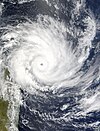Portal:Weather
The weather portal
Weather is the state of the atmosphere, describing for example the degree to which it is hot or cold, wet or dry, calm or stormy, clear or cloudy. On Earth, most weather phenomena occur in the lowest layer of the planet's atmosphere, the troposphere, just below the stratosphere. Weather refers to day-to-day temperature, precipitation, and other atmospheric conditions, whereas climate is the term for the averaging of atmospheric conditions over longer periods of time. When used without qualification, "weather" is generally understood to mean the weather of Earth.
Weather is driven by air pressure, temperature, and moisture differences between one place and another. These differences can occur due to the Sun's angle at any particular spot, which varies with latitude. The strong temperature contrast between polar and tropical air gives rise to the largest scale atmospheric circulations: the Hadley cell, the Ferrel cell, the polar cell, and the jet stream. Weather systems in the middle latitudes, such as extratropical cyclones, are caused by instabilities of the jet streamflow. Because Earth's axis is tilted relative to its orbital plane (called the ecliptic), sunlight is incident at different angles at different times of the year. On Earth's surface, temperatures usually range ±40 °C (−40 °F to 104 °F) annually. Over thousands of years, changes in Earth's orbit can affect the amount and distribution of solar energy received by Earth, thus influencing long-term climate and global climate change.
Surface temperature differences in turn cause pressure differences. Higher altitudes are cooler than lower altitudes, as most atmospheric heating is due to contact with the Earth's surface while radiative losses to space are mostly constant. Weather forecasting is the application of science and technology to predict the state of the atmosphere for a future time and a given location. Earth's weather system is a chaotic system; as a result, small changes to one part of the system can grow to have large effects on the system as a whole. Human attempts to control the weather have occurred throughout history, and there is evidence that human activities such as agriculture and industry have modified weather patterns.
Studying how the weather works on other planets has been helpful in understanding how weather works on Earth. A famous landmark in the Solar System, Jupiter's Great Red Spot, is an anticyclonic storm known to have existed for at least 300 years. However, the weather is not limited to planetary bodies. A star's corona is constantly being lost to space, creating what is essentially a very thin atmosphere throughout the Solar System. The movement of mass ejected from the Sun is known as the solar wind. (Full article...)
Selected article

The deadliest and most destructive natural disaster to ever hit the lakes, the storm killed over 250 people, destroyed 19 ships, and stranded 19 others. It produced 6-foot drifts of snow in the surrounding land areas, snapped power poles, and paralyzed many areas for days, especially the area around Cleveland, Ohio.
The financial loss in water-bound vessels alone was nearly $5 million, or about $100 million in present-day adjusted dollars. The large loss of cargo, including coal, iron ore, and grain, meant short-term rising prices for consumer products throughout North America.
Recently selected articles: Extratropical cyclone, Ice Storm of 1998, More...
Did you know (auto-generated) -

- ... that after Irish post office clerk Maureen Flavin Sweeney reported worsening weather conditions, Dwight D. Eisenhower agreed to postpone D-Day by 24 hours?
- ... that weather whiplash is the phenomenon of rapid swings between extremes of weather conditions?
- ... that an attempted British-Norwegian attack on the German battleship Tirpitz was abandoned after two Chariot manned torpedoes were lost due to bad weather?
- ... that the weather forecast for HD 189733 b is "Westerly winds at 2000 m/s, with molten glass showers"?
- ... that Eric Berger wrote about weather for the Houston Chronicle even before he became a certified meteorologist?
- ... that in the 1980s, "Sherman Bonner, The Human Thermometer" presented the weather on an Arkansas TV station?
Selected image

This tornado struck the town of Elie, Manitoba on June 22, 2007. It was the first tornado outside the United States to be rated F5 on the Fujita Scale, the most severe level of tornado damage.
Recently selected pictures: Dust storm, Parallax, Global snow cover, More...
More did you know...
...that the Flying river is the name given to the transport of water vapor from the Amazon rainforest to southern Brazil?
...that hurricane shutters are required for all homes in Florida unless impact-resistant glass is used?
...that the Joint Institute for Marine and Atmospheric Research is a combined weather and ocean research institute with the cooperation of the Office of Oceanic and Atmospheric Research and the University of Hawaiʻi?
...that the SS Central America was sunk by a hurricane while carrying more than 30,000 pounds (13,600 kg) of gold, contributing to the Panic of 1857?
...that a hurricane force wind warning is issued by the United States National Weather Service for storms that are not tropical cyclones but are expected to produce hurricane-force winds (65 knots (75 mph; 120 km/h) or higher)?
...that the Automated Tropical Cyclone Forecasting System is a software package for tropical cyclone forecasting developed in 1988 that is still used today by meteorologists in various branches of the US Government?
Recent and ongoing weather
- Wikinews weather portal
- March 26, 2021: Tropical moisture ceases to cause severe floods in South East Australia
- February 19, 2021: Winter storms hammer Texas, fatalities reported
- December 28, 2021: Typhoon Phanfone strikes Philippines
- February 1, 2022: Deadly floods in Brazil after heavy rainfall
- April 15, 2022: South African floods kill at least 300 people
- Weather of 2024
- 2024 Atlantic hurricane season
- 2020–21 North American winter
- 2024 Pacific typhoon season
- Tornadoes of 2024
This week in weather history...
June 30
1792: The first known tornado in Canadian history caused severe damage to forests on the Niagara Peninsula.
July 1
2005: Severe flooding shut down almost all transportation in the Indian state of Gujarat. More than 170 people were eventually killed by the flooding.
July 2
1963: Mohawk Airlines Flight 121 crashed while taking off from Rochester-Monroe County Airport due to a heavy thunderstorm. Seven of the 43 people on board were killed.
July 3
2014: Hurricane Arthur made landfall just before midnight near Beaufort, North Carolina, the first hurricane to strike the United States in almost two years.
July 4
1977: A severe windstorm, known as a derecho, struck areas of Wisconsin and Michigan.
July 5
1937: The temperature reached 45.0 °C (113.0 °F) at both Midale and Yellow Grass, Saskatchewan. This was the hottest temperature in the history of Saskatchewan, and until a 2021 heat wave was the hottest temperature ever recorded in Canada.
July 6
2005: A tornado outbreak spawned by the outer rainbands of Hurricane Cindy began over the Southeastern United States, including an F2 tornado that caused extensive damage to the Atlanta Motor Speedway.
Selected biography
John Dalton FRS (/ˈdɔːltən/; 5 or 6 September 1766 – 27 July 1844) was an English chemist, physicist and meteorologist. He introduced the atomic theory into chemistry. He also researched colour blindness; as a result, the umbrella term for red-green congenital colour blindness disorders is Daltonism in several languages. (Full article...)
Previously selected biographies: Sir George Stokes, Clement Lindley Wragge, More...
Related portals
Quality content
Other candidates:
- Featured Article Review: 2005 Atlantic hurricane season (Discussion)
- Featured List Removal Candidate: List of storms in the 2005 Atlantic hurricane season (Discussion)
Subcategories
WikiProjects
The scope of WikiProject Weather is to have a single location for all weather-related articles on Wikipedia.
WikiProject Meteorology is a collaborative effort by dozens of Wikipedians to improve the quality of meteorology- and weather-related articles. If you would like to help, visit the project talk page, and see what needs doing.
WikiProject Severe weather is a similar project specific to articles about severe weather. Their talk page is located here.
WikiProject Tropical cyclones is a daughter project of WikiProject meteorology. The dozens of semi-active members and several full-time members focus on improving Wikipedia's coverage of tropical cyclones.
WikiProject Non-tropical storms is a collaborative project to improve articles related to winter storms, wind storms, and extratropical cyclones.
Wikipedia is a fully collaborative effort by volunteers. So if you see something you think you can improve, be bold and get to editing! We appreciate any help you can provide!
Associated Wikimedia
The following Wikimedia Foundation sister projects provide more on this subject:
-
Commons
Free media repository -
Wikibooks
Free textbooks and manuals -
Wikidata
Free knowledge base -
Wikinews
Free-content news -
Wikiquote
Collection of quotations -
Wikisource
Free-content library -
Wikiversity
Free learning tools -
Wiktionary
Dictionary and thesaurus
Other Portals
What you can do
- Manually maintained portal pages from March 2020
- All manually maintained portal pages
- Portals with triaged subpages from March 2020
- All portals with triaged subpages
- All portals
- Portals with named maintainer
- Pages using Template:Post-nominals with missing parameters
- Physical science portals
- Weather
- Portals needing placement of incoming links
- WikiProject Weather
































